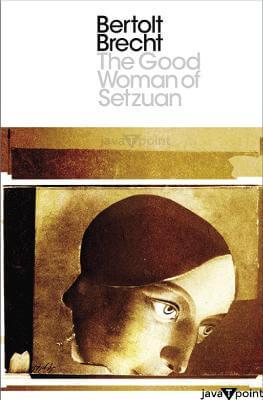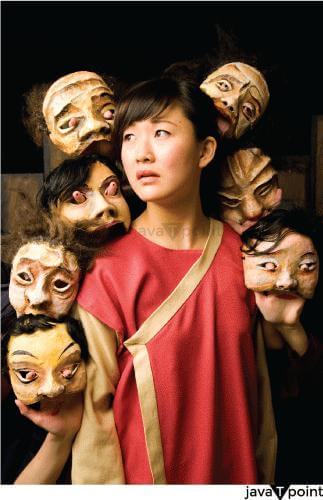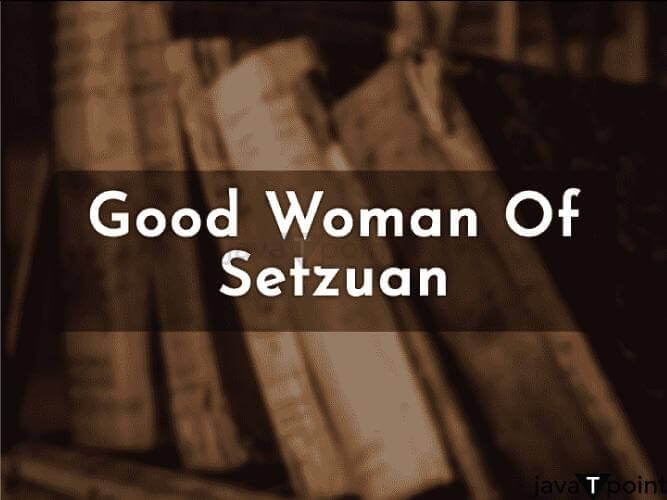The Good Woman of SetzuanIntroductionThe Good Woman of Setzuan is a 1943 production of Bertolt Brecht's drama, a "parable in 10 scenes," which was later published in 1953 under the title 'Der gute Mensch von Sezuan.' 'The Good Person of Szechwan' and 'The Good Soul of Szechuan' are the two among the various English translations. In the Chinese city of Setzuan, a young prostitute by the name of Shen Te is the subject of the play. A trio of gods is searching for a good person to serve as proof that humanity is worthwhile when they suddenly appear in the city. By offering to host them for the night, Shen Te demonstrates her goodness. She is the only person in the whole town who offers shelter to the gods. The gods pay her in exchange for the room. 
She purchases a tobacco shop with the money given by the gods. Shen Te's generosity and kindness are immediately abused by the underprivileged and jobless. Shen Te, who is about to lose her business, poses as her cunning and ruthless cousin Shui Ta. Shui Ta takes every unpopular stance to keep Shen Te upright. In The Good Woman of Setzuan, the question of how to live a good life in a capitalist society is raised. About the AuthorBertolt Brecht, who went by the real name Eugen Berthold Friedrich Brecht, was a German poet, theatrical reformer as well as a playwright who was born in Augsburg, Germany, on February 10, 1898, and died in East Berlin on August 14, 1956. His epic theatre broke the rules of theatrical illusion and created drama as a political and social platform for leftist causes. Background of the PlayAlthough The Good Woman of Setzuan isn't associated with a specific year, the frequent overhead flying of airplanes suggests that it takes place in the early to the mid-20th century. After escaping Nazi Germany in 1938, Brecht settled in Denmark and began to compose The Good Woman of Setzuan. However, in 1939, as the threat of war grew more imminent, Brecht was once again forced to flee, this time to the United States. In addition to finishing The Good Woman of Setzuan, Brecht made other important plays, such as Mother Courage and Her Children, along with The Caucasian Chalk Circle, while he was living in Los Angeles. All of Brecht's plays from this period critique capitalism, fascism, and humanity as a whole. His pessimistic assessment of humankind's innate greed and cruelty is a reflection of the horrors of World War II and the Holocaust, which led to the 1945 nuclear attacks of Hiroshima and Nagasaki, Japan. Violence, abuse of human rights, and genocide on an unimaginable scale, even after World War I, dominated the 1930s and 1940s. Therefore, the cynical, misogynistic viewpoints of The Good Woman of Setzuan are closely linked to the shock, horror, and grief that Brecht experienced at the time. Summary of the PlayWong, a meager water vendor from the destitute village of Setzuan, meets a group of scruffy, weary travelers one day at the city gates. They are immediately identified as gods by Wong. After hearing from the first god that their group needs a place to stay the night, Wong scrambles to find someone who will house the gods for the evening. However, they are denied shelter at every door in their town. After a long search with no results, the gods are eventually reluctantly accepted into the home of a kind prostitute known as Shen Te. Wong goes back to his home in a sewer drain. The gods tell Shen Te that she is the only "good human being" they have met while traveling and express their gratitude for her hospitality in the morning. Shen Te claims she doesn't think she is truly good and that it might be simpler for her to be good if she possessed more money. The third God insists on paying Shen Te some money for her issues, while the second God is skeptical about "meddling with the finances." The gods give more than a thousand silver money to Shen Te before continuing their search for good people on Earth to determine whether the world can "stay as it is" or if it needs to be completely remade. 
Shen Te rents a modest tobacco shop with the help of the money that is given to her by the deities, but she soon discovers herself in challenges as word of her good luck spreads throughout the town. The former owner of the shop, Mrs. Shin, is not happy and demands that Shen Te give her a sufficient quantity of rice to feed her family every day. The carpenter in the story is responsible for installing the shelves in the store for the owner before Shen Te threatens to remove them unless Shen Te pays him a huge sum of money. An unemployed man pleads for free tobacco stock with damage. Eight poor family members-a husband, wife, nephew, niece, brother, sister-in-law, grandfather, and a young boy-who once provided Shen Te with temporary shelter when she first arrived in Setzuan from the provinces start squatting in the store's back room. The landlord, Mrs. Mi Tzu, requires six months' rent upfront and two male references who can attest to Shen Te's financial stability. Shen Te says she has a business-savvy cousin named Shui Ta, and she assures that Shui Ta will visit as soon as she can to meet with Mrs. Mi Tzu and become a witness of Shen Te. Shen Te marvels at how desperately needy people cling to the "lifeboat" of one fortunate person's success as her busy first day at the shop comes to a close. As the gods continue to visit Wong in his dreams to see if Shen Te is still good, things become ever more complicated and touchier for Shen Te herself. During business hours, Shen Te, disguised as Shui Ta, ejects the family of eight, threatens the carpenter who made the shelves, haggles with Mrs. Mi Tzu, and at one point, even places an advertisement in the newspaper looking for a wealthy husband who can assist Shen Te in running her business. Shen Te, on the other hand, falls in love with Yang Sun when she runs into him in the park one afternoon. Yang Sun is a romantic, depressed, and unemployed pilot. Shen Te loves Yang Sun too much to accept the proposal for marriage (and financial support) of her wealthy neighbor, a barber named Shu Fu, despite the fact that Yang Sun is poor and cruel. Shen Te's needy neighbors complain that her newfound love is making her neglect her responsibilities to them, while Shen Te, in an effort to save Yang Sun from bankruptcy, enters into an agreement with an elderly couple who runs a nearby carpet shop. This move made by Shen Te calls into question her goodness. However, the bubble of love soon bursts for Shen Te as she discovers that Yang Sun doesn't actually love her and only uses her for her money while posing as Shui Ta one afternoon. Yang Sun needs to bribe someone at Peking Airfield in order to obtain a job. Shen Te nevertheless decides to proceed with her marriage to Yang Sun. The wedding is a disaster, and the marriage is never legalized because Yang Sun and Mrs. Yang, Yang Sun's mother, insist on holding off on the ceremony until Shui Ta shows up. Shen Te's struggles are mentioned to the gods every time they appear in Wong's dreams, but they insist that Shen Te would become stronger and more moral as a result of her hardships. When Shen Te rushes into her disguise as Shui Ta to take advantage of the large stock of stolen tobacco that the family of eight brings into Mrs. Shin's shop, Shen Te quickly makes Mrs. Shin aware of her scheme. Shen Te, posing as Shui Ta, is given a blank cheque by Shu Fu to start a business in a string of cabins that Shu Fu manages outside of the city. But Shen Te has gotten pregnant with Yang Sun's unborn child. Mrs. Shin cautions her that if Shu Fu learns about the condition of Shen Te, he will stop being so kind. Shen Te determines to remain in her disguise for months while posing as Shui Ta. The tobacco industry prospers, and Shui Ta's steady increase in weight is attributed to his increasing wealth and gluttony, but the village's poor start to miss the kind, giving Shen Te and even start to suspect that she has been murdered. At Wong's request, a police officer confronts Shui Ta and asks where Shen Te is. Shui Ta is unable to provide an answer. He is detained. Wong forewarns the divine gods that in case Shen Te has truly disappeared, then "all is lost," and the gods unwillingly agree to go back to Setzuan to help search for her. The entire village congregates for Shui Ta's trial. To hear the arguments, the gods appear as a panel of judges in disguise. The affluent businessmen who have worked well with Shui Ta defend him, but the destitute who are missing Shen Te and have only ever experienced Shui Ta's cruelty, condemn him. Shui Ta claims that if Shen Te had remained in the village, the villagers would have torn her to pieces. This is in response to the agitated crowd's demand to know why Shen Te left Setzuan. Shui Ta requests that the courtroom be made empty because he needs to tell the judges a confession. Shen Te gives up her disguise when she is on her own in the room along with the gods and tells them the truth. The gods are in disbelief. Shen Te laments how difficult it has been to try "to be good and yet to live"; she feels as though she has been torn in two. She finds it repugnant that good deeds are punished while bad deeds are rewarded. The gods, on the other hand, advise Shen Te to stop criticizing herself and express their delight at having located the lone decent individual they had come across during their entire journey. Shen Te emphasizes that she fell short of being a good woman and changed into a "bad person." The gods decide to ascend into the sky on a pink cloud to go back to their "void" rather than assist Shen Te in resolving her moral quandary. Shen Te requests the gods to advise her on how to deal with all of her complications, but they only give her the advice to "continue to be good." One of the characters in the play steps ahead to deliver a speech that isn't attributed to any particular character during the play's brief epilogue. The actor implies that the play's resolution and the choice of what will change the world-new gods or the belief in God, materialism or solitary living, moral rectitude or increased decadence-are up to the audience. ThemesVarious themes in the text come into the foreground when we critically analyze the text, such as the effect of capitalism on our society, corruption, and greed, good versus bad, and so on. Let us look at some of these themes in brief: 1.The Pursuit of GoodnessIn the text, The Good Woman of Setzuan, Bertolt Brecht poses as Shen Te, a disadvantaged woman who is chosen by the gods as the only "good" person on Earth, to ask whether it is ever possible to be completely, plainly "good." In the end, Brecht demonstrates how the limitations of modern society make it unattainable for a person to ever be completely good as Shen Te struggles throughout the play to be good to other people and herself-and she repeatedly fails. In the end, Brecht makes the argument that the pursuit of goodness is more significant than actually achieving goodness itself in a world where true, unquestionable goodness is impossible. A trio of gods travels to Earth early in The Good Woman of Setzuan in search of a single trustworthy individual who can persuade them to leave the world as it is. The 
gods appear to be in a desperate search for this one individual, so desperate that they decide to use Shen Te, a kind but flawed woman, as their model of virtue after she allows them to spend the night in her room. Shen Te does her best to be "good" despite mounting pressure and issues during the rest of the play while being burdened by the gods' favor. Brecht shows Shen Te's shortcomings at key moments in action, but her actions demonstrate that striving for good is just as admirable as obtaining the elusive label of "good person." 2.Greed, Capitalism, and CorruptionTheft and bribery are commonplace in Setzuan, an extremely poor village. Much like the larger world outside, the village is governed by money. The Good Woman of Setzuan by Bertolt Brecht, a composer and playwright whose plays, poems, and operas all explore the impact of capitalism and greed in modern society, makes the argument that the current level of immorality is significantly influenced by money, capitalism, and corruption. Brecht contends that in a capitalist society, the only way to advance is by actually benefiting from others. According to Brecht, money and capitalism are the causes of humanity's inability to "refuse to be bad." Many of Brecht's other plays explore the impact of greed, the capitalist system, and corruption. Still, in The Good Woman of Setzuan, he expresses one of his most direct-and profoundly frustrated-sentiments about how it is fundamentally impossible to reconcile humanity's desire to act morally with how difficult it is to be a truly good neighbor, lover, or employer under the oppressive weight of capitalism. 3.Women and Multiple PersonasShen Te, the titular "good woman" in The Good Woman of Setzuan, is shocked to learn that her neighbors, her companions, and even the man she loves don't respect her wishes, pay attention to her advice, or return the numerous favors she performs for each of them. Shen Te develops a secret identity as her "cousin," Shui Ta, with the goal of maintaining her "goodness" while completing the challenging tasks required to thrive in a capitalist society. Shen Te is meek and self-denying, whereas Shui Ta is demanding, practical, and unapologetic. Shen Te despises "being" Shui Ta, but she is aware that she must have her "bad cousin" in order to survive. Brecht makes the case that women must adopt dual identities to be heard in a society where their voices are suppressed, and their independence is denied, demonstrated by the dual character of Shen Te and Shui Ta. Brecht uses Shui Ta as a metaphor to highlight the lengths women will go to so that they can achieve their goals. 4.Divine Vs. HumanityThree unnamed gods visit Earth in The Good Woman of Setzuan in search of a good person. By the time they get to Setzuan, they have spent a lot of time searching the entire planet for a single individual leading a life "worthy of human beings." The gracious, accommodating Shen Te invites the gods inside, and after they experience the good for the first time, they decide that their mission is worthwhile. As the play progresses, the gods continue their journeys to find more good people, but they also frequently appear in Wong's dreams to inquire about Shen Te's well-being and whether she continues to be good. As a result of this overlap between the human and divine worlds, Brecht depicts gods as gloomy, foolish characters who are comparatively just as lost, hopeless, and equally helpless as humans are. Brecht's grim conclusion is that the human world is so filled with "misery, vulgarity, and waste" that even a trio of gods might just choose to leave humanity to its vices compared to wasting their life intervening in the midst of a hopeless situation. In order to access the more general question of whether or not humanity is even worth the time, energy, and effort, Brecht takes the help of the theme of divine invasion to represent God's point of view throughout the play to illustrate how the world has degenerated. He makes use of their central question of whether or not they must remake the world. The three gods serve as a sort of chorus throughout the play, dipping in and out of the action and frequently only appearing in Wong's dreams. The Gods' stated goal is to determine whether to leave the earth as it is or to take action to alter it; to do this, they must locate a sufficient number of individuals who are "living lives worthy of human beings." ConclusionBrecht's play serves as a very good example of how the world has degenerated with time and how corruption, greed, gluttony, jealousy, and dishonesty are at their peak in this new world, making it impossible for someone to be good. The play emphasizes that the pursuit of goodness is just as important as being truly good. It also shows how women who possess wealth or are good are even brought down by society for their own benefit, while a man who is unapologetic and cruel is appreciated and isn't targeted by anyone.
Next TopicSummary of the Poem Death the Leveller
|
 For Videos Join Our Youtube Channel: Join Now
For Videos Join Our Youtube Channel: Join Now
Feedback
- Send your Feedback to [email protected]
Help Others, Please Share









